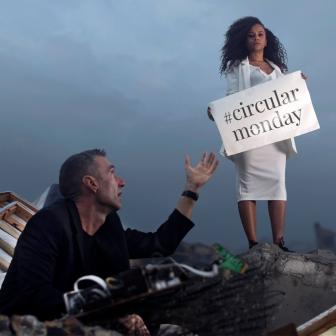From Circular Monday to Black Friday
November 20, 2020Resources and emissions: between sustainability and consumption
After a year with many setbacks for general consumer confidence, retailers and manufacturers are hoping for a best-possible final business spurt this Christmas season. Black Friday – the last Friday in November each year – used to signal the start of that final stretch. It is now being supplemented by an earlier, much more sustainable event: Circular Monday on the preceding Monday, taking place this year on 23rd November. It demonstrates and encourages alternatives to conventional consumer habits, which is primarily determined by the consumption of resources. Here, the focus is on resource efficiency and recycling, based on the slogan “Rent – Repair – Reuse”.
There is another method which compliments Circular Monday: opting for climate neutral products. This is where the production of consumer goods and the aim to conserve resources and reduce emissions meet.
Circular Monday calls for approaches to avoid purchasing new products – such as renting, repairing or reusing. This form of circular economy preserves resources, generates only minimal carbon emissions and, overall, has a much smaller carbon footprint than the conventional production and consumption of goods. It is for precisely this reason that Circular Monday and climate neutrality go hand in hand, as the most efficient possible use of resources and the reduction of emissions through reuse are cornerstones that both concepts aspire to.
If anything, climate neutral
The production and consumption of consumer products is not generally ‘bad’; after all, our current economy is dependent on this system. More and more, consumers have the option to opt for a climate neutral product. Manufacturers of cosmetics, toiletries, foodstuffs, drinks, fashion items and sports equipment in particular are going down this road, and are increasingly offering climate neutral products and services. They are offsetting emissions created by the production and transportation of their goods, and working on reducing them further. An increasing number of these products bear ClimatePartner’s climate neutral label; it provides transparent information about the amount of CO2 that has been offset.
The common aim: carbon offsetting
For nearly 15 years, we at ClimatePartner have been working to reduce carbon emissions released into the atmosphere, and have been supporting companies so that they can offer climate neutral products and further reduce their emissions.
Some have lead by example, such as Swiss startup Kickbag with their climate neutral and reusable mailing bags, German pen maker Edding with the climate neutral EcoLine pens made from largely recycled materials, or fashion innovator FOND OF with their “most responsible product” backpack from its brand ‘pinqpong’, which is made almost entirely from recycled materials.
This list is getting longer on a near-daily basis. Almost 3,000 companies are now working with us to implement climate neutrality, resource efficiency and emission reduction in their business processes and products. The range of sustainable products bearing our climate neutral label is also growing. This means consumers have access to transparent information about their purchased goods and can make informed decisions every single day. On Monday, Friday and each day in between.

